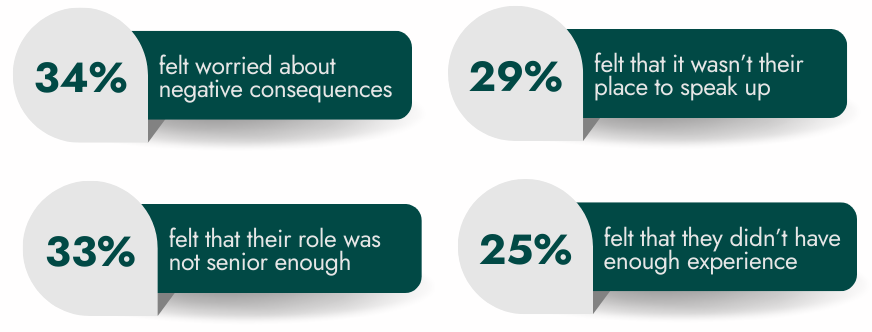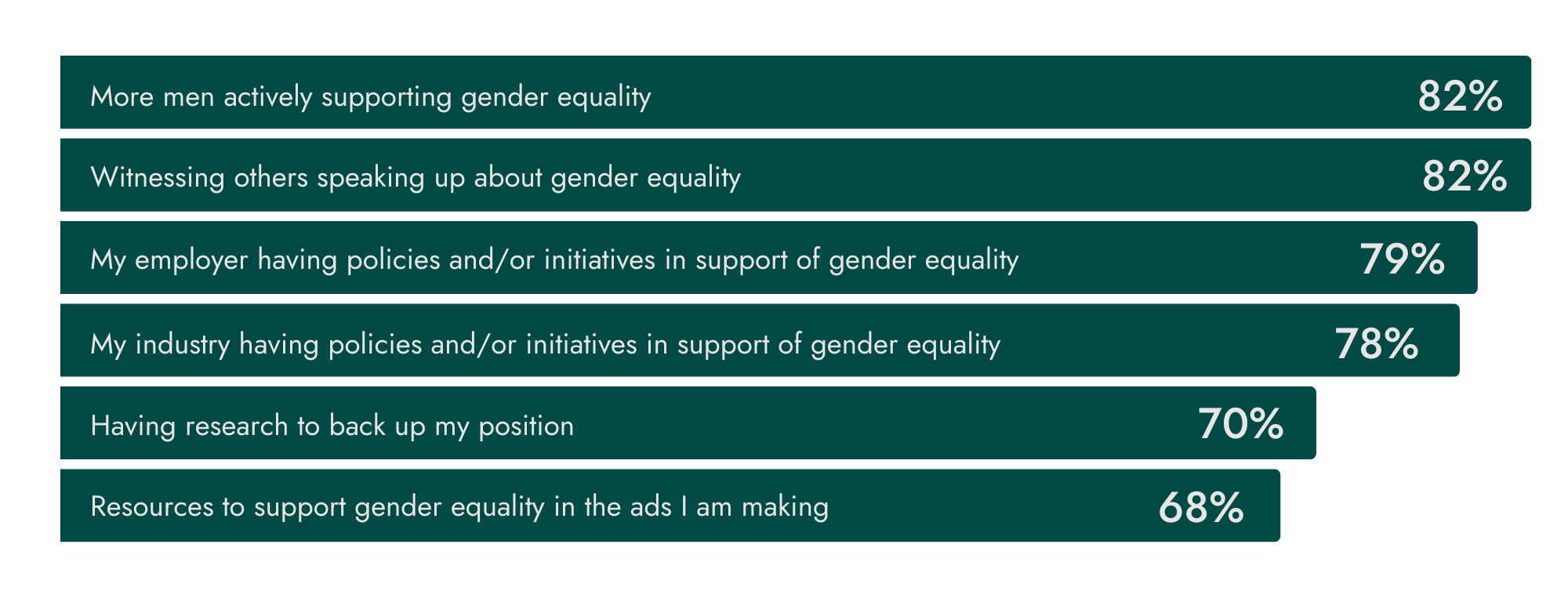Speaking up about Stereotypes
July 2022
A perfume ad running in India was pulled from air this month for promoting sexual violence. The ad caused outrage online from celebrities and activists, including actress Priyanka Chopra who said on Twitter: “Shameful and disgusting. How many levels of clearances did it take for this commercial to be green lit. How many people thought this was ok?”
While things may not seem so bad in the Australian advertising landscape, harmful stereotypes are rampant on our screens every day. And every time we see a woman sexualised for a biscuit ad or a thousand mothers trapped behind a kitchen bench, we can ask the same of ourselves: how many people thought this was ok?
But maybe that’s the wrong question to be asking.
We know people working in advertising see stereotypes as a problem and many voices across the industry have been calling for drastic change for decades. 85% of respondents to The shEqual Survey said that better representation of all genders makes for better ads.
The vast majority of people also know that gender stereotypes in ads contributes to poor body image (82%), mental health (79%) and violence against women (66%)
So if advertisers are aware of the dangers of sexist ads, perhaps the question we should be asking is: what is stopping people speaking up?
Why don’t people speak up about gender equality?
When we asked people in the industry why they had hesitated to speak out in the past, their answers paint a troubling picture.

158 people explained why they did not feel they could speak up.These included respondent who reported being ‘not senior enough’ and felt that it’s management’s responsibility (25%), those who were scared of backlash like losing their job (21%), and people who had had a negative experience after speaking out in the past (6%)
Being completely shut down by my male boss when I was a junior in front of the team who were all men. They laughed – Female 35-39 years, agency
The impact of fear

46% of women and 17% of men worried about negative consequences if they spoke up about gender equality issues in their workplace.
30% of women and 12% of men said they had experienced negative consequences from speaking out about gender equality issues in their workplace.
Importantly, while 57% of women respondents said they would be encouraged to speak up if more men did, our findings showed that men were also worried about the consequences of speaking up. This means we need to first address the culture that allows this fear to thrive.
The impact of workplace culture
This fear experienced by women and men in the industry is based on real threats to people’s wellbeing and safety in the industry.
128 people told us, in their own words, the negative outcomes they have experienced due to speaking up.
Those included:

Here are some quotes captured in our survey:
Being [gaslit] (told I am exaggerating a genuine problem), eye-rolling, general denial of the issue. Being labelled as a ‘feminist’, being lampooned or ridiculed, being called a lesbian, being avoided/overlooked/discriminated against after being labelled as a ‘troublemaker’ – Female 50-54 years, ad agency
Being a woman, I’ve experienced being shut down or other women around me being shut down/dismissed as either being ‘out of touch’ or too emotionally driven when bringing up gender equality and the most controversial topic is typically the gender pay gap – Female 25 29 years, client/ad agency
Being ignored and/or dismissed. Told I was reading too much into it or not ‘getting the idea’. Without someone else in the room who could see what I see or understand my opinion it is hard to make the point feel real – Female 30-34 years, client/ad agency
How can we expect anyone to speak up about stereotypes when their workplaces aren’t safe spaces to do so? When threats like these looms over your head, regardless of you gender or professional experience, the risk is too great to take. To change the ads we see, we first need to change this culture of fear and silence that permeates the industry who make them.
Changing the culture of silence
The promising news is that there is widespread support within the industry to break this culture of silence and inequality.
If you want more people to ride bikes you build bike paths. The industry needs to be a safer space before any work can be done to improve equality. …Toxic behaviours are brushed off as “it’s just advertising”. How can we have gender equality when these businesses often lack basic respect. Why speak up when serious misconduct isn’t even taken seriously? – Female 30-34 years, agency/client
What solutions the industry wants to see

When asked in the shEqual Survey, people in the industry were almost unanimous in saying that more people speaking out would encourage them to speak out themselves. But how do we create a safer space within the industry to allow for more people to speak out?
One of the suggestions from the survey was to have industry or organisation-wide policies and initiatives that support gender equality. This should include pay transparency, flexible working arrangements, leadership programs for women and removing longstanding non-disclosure agreements that protect perpetrators of sexual harassment and bullying.
Much of this work is already being done by passionate people in the industry who are fed up with not seeing change. This action in real-time looks like Trinity P3’s new declaration requirement for agencies they engage with, The Aunties and Assisterhood mentorship programs, and Fck The Cupcake’s new initiative Be The Change, mentoring and educating men in the industry in gender equality. The movement is growing but we need everyone on board.
Gender equality needs to be given greater priority in adland so both women and men can feel safe at work and start speaking out more. Only then will we start to see real change in the ads we see every day.
If you would like to see gender equality prioritised in your workplace, you can start by taking the Gender Equality in Advertising Training with your team. This one-day course is the only gender equality training specifically designed for the advertising industry. To learn more, click here.



